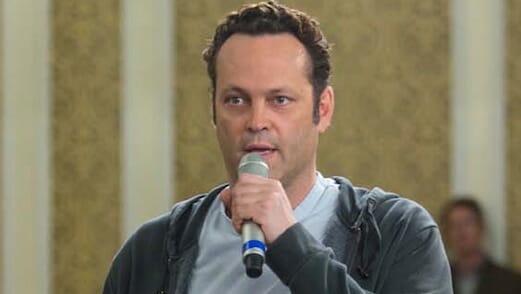Delivery Man

From the moment Ken Scott’s French-language Starbuck was released in Canadian cinemas in 2011, the consensus was that, given its high-concept nature, a Hollywood remake was inevitable. In turn, Canuck critics and moviegoers alike indulged in fantasy casting concerning who would fill Quebec star Patrick Huard’s schlubby shoes as the hard-luck David Wozniak in this goodnatured yarn about fatherhood and responsibility. Odds are, the name Vince Vaughn didn’t feature on many ballots.
That said, having earned a reputation as a frequently difficult, often unmotivated star, Vaughn is actually well-suited for a redemption arc. Had Scott tailored the script for this English-language remake to play to his leading man’s strengths—which are hardly legion—a convincing story concerning reformation might have naturally taken shape. Regrettably, other than relocating his film from Montreal to New York City and replacing hockey references for their basketball counterparts, nothing else has been altered. Consequently, Wozniak remains the same faintly sketched character he was in Starbuck, making it incumbent on the actor playing him to fill in the blanks, conveying life experiences not imparted by the copious expository dialogue. Alas, Vaughn doesn’t do much heavy lifting.
That aforementioned high-concept premise that caught DreamWorks’ eye (and left them seeing dollar signs) is simple enough: David, a fuck-up-waiting-to-happen delivery driver, is hit with a devastating one-two punch. First, his long-suffering, no-nonsense girlfriend, Emma (Cobie Smulders), advises him that she’s pregnant and doesn’t see him as father material. (For instance, he owes $80,000 to some local loan sharks who are starting to circle.) Next, he’s informed that he’s already a biological father to some 533 children. It seems he dropped into a sperm bank with alarming frequency in the ’90s. Now, 142 of his progeny are launching a class-action lawsuit aimed at having him publicly reveal his identity. Maintaining his anonymity on the advice of his hapless lawyer (Chris Pratt, unable to elevate the middling material he’s saddled with), David sets about stalking his progeny in order to learn more about them.
The sequence that follows is seemingly designed to reflect the “spectrum of fatherhood.” If the heaping dose of saccharine associated with such a phrase leaves you feeling queasy, be warned: the scenes themselves won’t sit any easier. Lest David be left with the impression that every kid grows up to be a NBA star (as is the case with the first son he tails), other offspring have significant crosses to bear. Fortunately, he possesses a remarkable knack for instantly alleviating their burdens, curing a daughter’s heroin addiction by just letting her be and bettering a disabled son’s lot simply by “being there.”
-

-

-

-

-

-

-

-

-

-

-

-

-

-

-

-

-

-

-

-

-

-

-

-

-

-

-

-

-

-

-

-

-

-

-

-

-

-

-

-








































